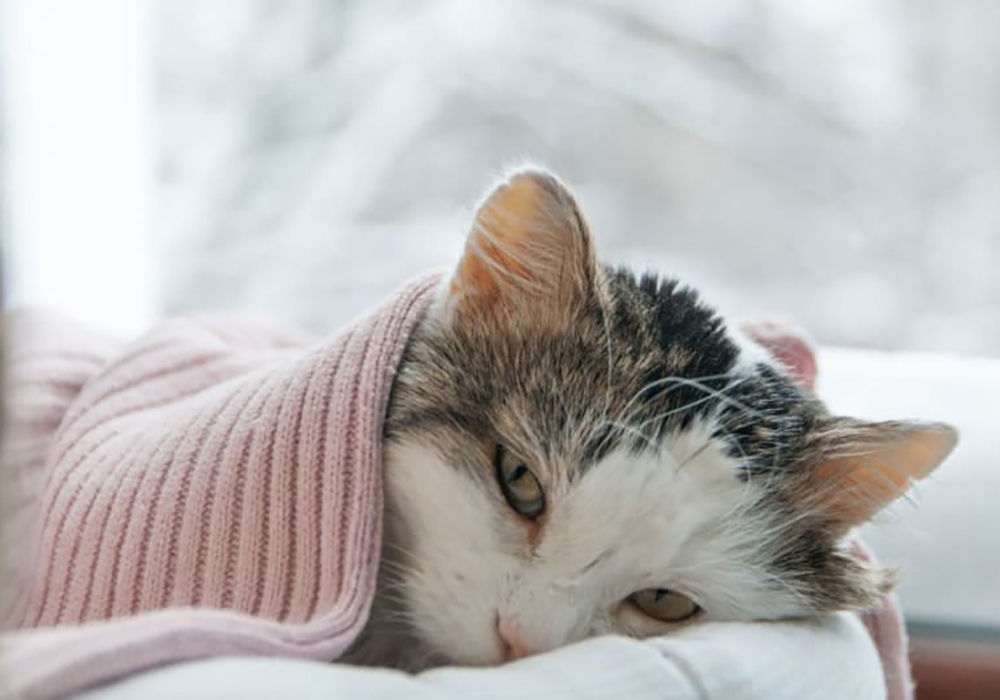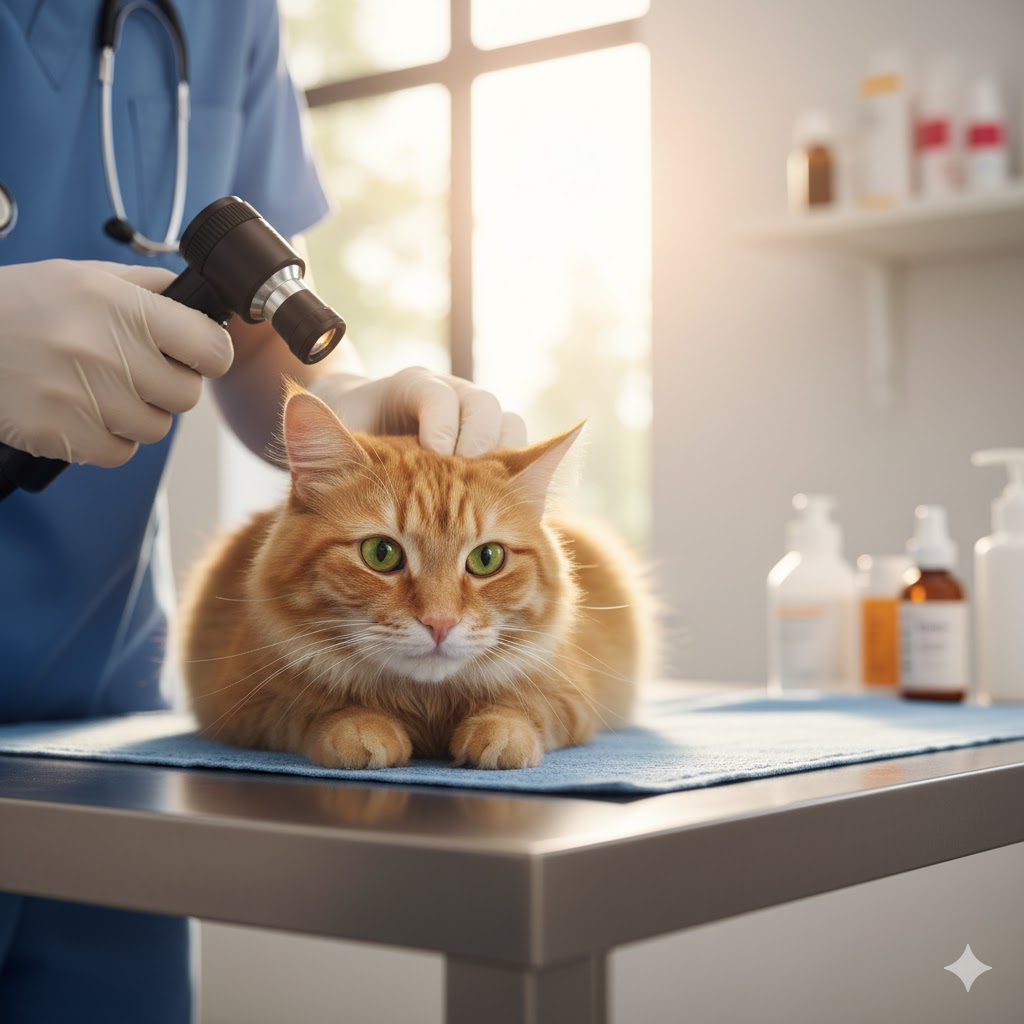Looking after your cat’s safety is just one part of being a responsible pet owner, their health needs attention too.
Here are five key aspects to keep in mind:
Essential Preventative Care
Being a responsible cat owner means ensuring your pet is neutered, vaccinated against common illnesses, microchipped, and taken for routine veterinary check-ups.
Registering With A Vet
It’s important to register your cat with a veterinary practice as soon as possible. Ask friends or neighbors for trusted recommendations, or visit local clinics to find the right fit.
Vaccinations
Both kittens and adult cats need vaccinations to stay protected from various diseases. Kittens typically receive their first vaccinations between 8–9 weeks of age. Regular boosters will be needed throughout your cat’s life.
Parasite Prevention
Fleas and worms are frequently encountered by cats, but they’re not always easy to detect. Your vet can help you choose the most suitable prevention or treatment based on your cat’s lifestyle.
Caring For Senior Cats
Cats are considered seniors from around 12 years old. At this stage, they may need additional care and attention to ensure their golden years are as comfortable and enjoyable as possible.
Routine Health Care For Cats
Routine care includes neutering, microchipping, vaccinations, parasite control, and regular veterinary visits.
Vaccinations protect against a number of infectious diseases. To stay protected, cats should receive booster shots on a regular schedule.
In addition to medical care, your cat should also be groomed regularly, checked for dental issues, and provided with a balanced, nutritious diet to keep them healthy and happy.
Signs Of Illness
Whenever possible, it’s important to gather as much information as you can about a cat’s medical history. If the cat has had any recurring issues or ongoing health conditions, these should be clearly noted.
Cats are naturally skilled at masking pain and illness, which means that even attentive owners may not realize something is wrong. If you observe any unusual behavior or physical changes in your cat, it’s a good idea to consult your vet. Watch for symptoms such as coughing, sneezing, nasal or eye discharge, or any lumps, bumps, or open wounds.

Obesity
Providing a well-balanced diet is essential for maintaining your cat’s overall health. It’s best to choose a trusted brand of cat food that contains all the necessary nutrients your cat requires.
Managing your cat’s weight is especially important—avoid overfeeding and ensure they get regular physical activity. To check if your cat is at a healthy weight, you should be able to feel their ribs with a gentle stroke along their sides.

Elderly Cats
As your cat ages, their behavior and needs may shift. It’s important to monitor them regularly to ensure they remain in good health.
If you notice any changes in their overall condition, eating habits, or ability to move around, it’s a good idea to have them checked by a veterinarian.

Common Cat Illnesses
Signs Your Cat May Be Unwell
Cats are very good at concealing discomfort or illness, which can make it difficult to tell when something isn’t right. Often, the symptoms can be quite subtle. The most reliable way to catch any health issues early is to schedule regular veterinary check-ups and to visit your vet as soon as you notice anything unusual.
While symptoms can vary depending on the specific illness or condition, some common signs that your cat may be unwell include:
Hiding more often than usual;
Drinking significantly more or less water;
Loss of appetite;
Sleeping more than normal;
Sudden or unexplained weight loss;
Changes in grooming behavior (such as excessive grooming or completely stopping)
What Are The Most Common Cat Illnesses?
Unfortunately, cats can suffer from a range of health issues, just like humans. However, there are certain conditions that vets tend to see more frequently in cats. Below are some of the most common illnesses and what to look out for.
Fleas
Fleas are a widespread problem among cats (and other animals). These tiny parasites bite and irritate your cat’s skin, causing itching and discomfort. If your cat has fleas, you might notice them scratching more than usual, see small bites on their skin, or even find flea bites on yourself. The most effective way to prevent fleas is by using regular flea treatments prescribed by your vet—for all pets in your household. It’s also important to treat your home, as fleas lay eggs in carpets, bedding, and soft furniture.
Worms
Worms are another common parasite in cats. There are two main types your cat might catch. Signs of worms can include an itchy bottom, tummy upsets, or visible worm segments in your cat’s stool or bedding. To protect your cat, make sure you’re giving them a vet-recommended worming treatment on a regular schedule.
Cat Flu
Like humans, cats can catch a flu-like illness—but only from other cats, not people. Symptoms may include a runny nose, watery or sore eyes, and in severe cases, it can be life-threatening. Vaccinating your cat and keeping up with booster shots is the best way to protect them from cat flu.
Diabetes
Cats can develop diabetes in a way that’s similar to people. It often requires ongoing treatment, such as insulin injections. Cats that are overweight are more likely to develop diabetes, so a healthy diet and regular exercise are key. Watch for signs like increased thirst, unexpected weight loss, or excessive sleeping. If you spot these, it’s important to see a vet promptly.
Feline Leukaemia Virus (FeLV)
FeLV is a serious and often fatal condition passed from cat to cat through infected saliva—commonly from sharing food or water bowls, mating, or fighting. Early symptoms may include recurring respiratory infections and digestive problems. Vaccination is the most effective way to prevent FeLV. Keeping infected cats separate from healthy ones is also essential.
Feline Parvovirus / Feline Infectious Enteritis (FIE)
This dangerous virus can be especially deadly for kittens. Symptoms may include vomiting, extreme thirst and hunger without being able to eat or drink, and severe watery diarrhoea. If you suspect parvovirus, urgent veterinary care is crucial. Vaccination is your cat’s best defense against this serious disease.
Chlamydia Felis
This bacterial infection is relatively common and typically causes conjunctivitis and thick yellow eye discharge. Treatment often involves antibiotic eye drops or medication if the infection has spread. If your cat is infected, make sure to wash your hands after handling them. Vaccination can help reduce the risk of reinfection.
How Can I Prevent My Cat From Getting Sick?
While some illnesses can’t be avoided, many common cat diseases are preventable.
Regular vaccinations—and keeping up with booster shots—are one of the best ways to protect your cat from serious illnesses like cat flu, FeLV, and parvovirus.
Feeding your cat a nutritious, balanced diet and maintaining a healthy weight can also help prevent conditions such as diabetes and arthritis. Active, well-fed cats are generally healthier overall.
Parasite prevention is another key part of your cat’s health care. Using effective flea and worm treatments from your vet will help keep these pests at bay. Be cautious with over-the-counter treatments, as some may not work well—and some products made for dogs can actually be harmful to cats. It’s always safest to use vet-recommended options tailored to your pet’s needs.










